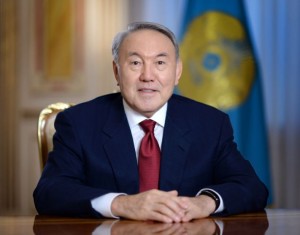ASTANA – In a televised address to the nation, President Nursultan Nazarbayev announced his decision to call an early presidential election in Kazakhstan on April 26.
“In the interests of [our] people … and to fulfil the demands of the law, I took a decision and, in line with paragraph 3.1 of the national Constitution’s Article 41, signed a decree to set the early presidential election for April 26,” Nazarbayev announced.
The initiative to move the vote one year ahead was put forward by the Assembly of the People of Kazakhstan (APK), a constitutional body representing the country’s numerous ethnic groups. The assembly’s statement on Feb. 14 referred to “numerous appeals of citizens,” and called for an election to give the President “a new mandate” to implement the economic stimulus programme to counter the global economic challenges affecting Kazakhstan. The initiative found support from both chambers of the parliament, which appealed to the President to accept it.
Addressing the nation in the evening hours of Feb. 25, Nazarbayev noted that he had been receiving plenty of messages from citizens expressing their anxiety about Kazakhstan’s future in light of growing instability and escalating conflicts in the regional neighbourhood. “People understand that [to prevent the negative impact] we need to strengthen stability and unity in our society,” Nazarbayev emphasised.
With the adverse effects that global economic uncertainty and falling commodity prices are having on the Central Asian nation’s economy, the people of Kazakhstan need “confidence in their future,” and that “means maintaining jobs, stability, welfare benefits, salaries, scholarships.”
Also, citing national security concerns in light of growing geopolitical tensions, the Kazakh leader said he felt there is a growing demand among his compatriots for a “continuation of balanced domestic and foreign policies.”
In this regard, Nazarbayev quoted from a letter from Nina Misochenko, a resident of the country’s central Karaganda Oblast. She wrote to the President that she “prays daily for our children, for peace and concord in our country, so that no confrontation and no war come to our home.” The woman said she cherished the fact that the people of Kazakhstan live quiet and confident lives, dedicating themselves to hard work and raising their children in an atmosphere of peace and stability. “Let it last,” she appealed.
“Thank you [for this], Nina Alekseyevna,” President Nazarbayev said on TV, using her first name and patronymic.
The Kazakh leader continued to explain that due to the significant decrease in the prices of the country’s major export commodities, the government had to revise the national budget and introduce a number of major preventive measures. He emphasised that Kazakhstan had a “clear plan of action, social cohesion and sufficient resources” to tackle the effects of the global economic downturn.
Reflecting on the APK initiative, Nazarbayev said that he had held the legally mandated consultations on the issue with the chairs of the Constitutional Council, the Senate and Mazhilis (lower chamber of parliament), and the prime minister on Feb. 25, before taking the decision to call the vote.
Earlier, at the request of the Senate, the Constitutional Council reviewed the legal aspects of the assembly’s initiative and on Feb. 24 ruled that the President had a clear legal prerogative to bring the election forward.
Announcing the date of election within two months of the decision, as required by the country’s constitution, Nazarbayev underlined the need to hold the election “in strict accordance with the law, openly and fairly,” with the active involvement of domestic and international observers.
“In terms of my own participation in the upcoming election I will decide later, in line with the constitution and laws of our nation,” Nazarbayev stressed, .
Nazarbayev has enjoyed overwhelming popularity throughout his more than two decades in power. During the presidential election campaign in February 2011, an opinion research poll commissioned by the Washington-based International Republican Institute and conducted by independent pollster Gallup put his support in the country at 90 percent.
In the years since, the country has seen solid economic growth of 4 – 6 percent annually on average, albeit markedly slower growth rates compared to the early 2000s, before the global financial crisis hit Kazakhstan in 2007 – 2009.
The Constitution of Kazakhstan limits presidential service to two five-year terms, with an exception made for the country’s First President, i.e. Nursultan Nazarbayev.

